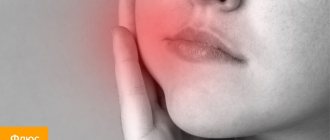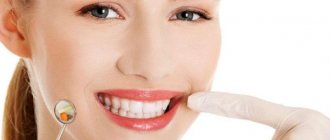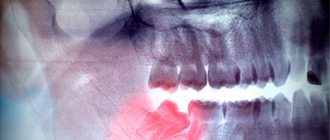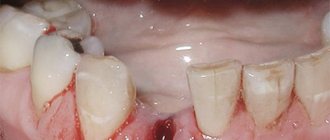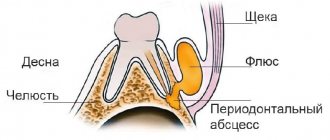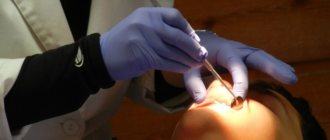Causes
The causes of tongue pain can be very diverse, ranging from mechanical damage to the presence of cancer. Most often, pain occurs for the following reasons:
- presence of mechanical damage;
- development of inflammatory processes;
- various allergic reactions;
- development of neuralgia;
- the presence of hidden diseases of other organs of the human body;
- blockage of the salivary gland;
- presence of cancer.
The most common cause of pain on the tip or sides of the tongue is mechanical damage. Most often, the patient receives such injuries during eating, and they include biting, burns, scratches and cuts. The tongue can also be injured by chipped tooth enamel, an uncomfortable denture, or an unscrupulously installed filling with sharp edges. Constant, even minor injury can lead to long-term pain.
Inflammatory diseases of the oral cavity are dangerous and painful. If a patient has a sore tongue, throat, palate, and it hurts to swallow, the doctor has every reason to suspect the presence of inflammatory processes in the oral cavity. They can be caused by viral diseases of the nasopharynx, as a result of which the patient's sublingual lymph nodes become enlarged. In this case, the patient complains of pain when swallowing at the base of the tongue. With such symptoms, you should consult an otolaryngologist, since the cause of pain in the tongue may be acute purulent tonsillitis, which requires immediate medical treatment.
Another cause of pain is viral stomatitis. It affects both the surface of the tongue and the entire mucous membrane of the oral cavity. The disease is painful, causes difficulty in eating, and causes discomfort to the patient.
Often the causes of pain in the tongue lie in the presence of an allergic reaction in the patient. This could be an allergy to food or medications. Typically, the patient complains of tongue pain after eating, especially after kiwi, pineapple, seeds, drinking alcohol, and also after smoking a pipe and cigarettes.
Most often, an allergic reaction is expressed in the form of stomatitis or fungal diseases. Consumption of spicy food and alcohol only aggravates the painful condition. Discontinuation of those drugs and products that cause an allergic reaction leads to the disappearance of allergy symptoms.
Neuralgic diseases usually significantly complicate correct diagnosis; in this case, it is difficult to determine why the patient’s tongue hurts. The most common neuralgic disease is glossalgia. It occurs as a result of malfunctions of the endocrine system, as a result of neurogenic disorders, and also as a reaction to mental trauma or severe stress. With glossalgia, partial or complete numbness of the tongue, tingling, burning, and rapid fatigue of the tongue when speaking are observed. Often with glossalgia, the lips also hurt; the patient complains that he has a headache and a numb tongue.
Another reason for the appearance of pain in the tongue is the presence of hidden diseases of other organs and systems in the patient. The tongue reacts sharply to any changes in the condition of the body, and the result of infectious diseases of the body can be glossitis - inflammation of tissues.
Soreness can also be caused by diseases of the gastrointestinal tract, cardiovascular and endocrine systems, as well as the presence of anemia in the patient.
A blockage in the salivary gland, which is located near the tongue, can also lead to pain. In this case, the patient complains of pain under the tongue, constant discomfort and soreness of the oral cavity.
The most serious cause of tongue pain is cancer. In this case, patients complain of pain inside the tongue. In the early stages of cancer, there may be no pain at all; it usually appears in later stages. The treatment of oncological diseases is carried out by an oncologist, to whom both a general practitioner and a dentist can refer if there is a suspicion of oncological disease.
Which doctor should I contact?
If you experience discomfort in your tongue, it begins to tingle or hurt, be sure to make an appointment with a specialist. In such a situation, you can contact both a dentist and an otolaryngologist. In any case, if necessary, the doctor will redirect you to the right specialist.
Only a specialist can prescribe the correct treatment
You can choose the right course of treatment only if you have an accurate diagnosis. Pain in the tongue is a symptom that is characteristic of many pathological conditions, and may be an echo of a serious systemic disease of the body. Self-medication is simply inappropriate here. Otherwise, you can only aggravate the situation and bring it to very disastrous consequences. If pain appears in the main speech organ, be sure to see a doctor.
- Kazarina L.N. Diseases of the oral mucosa, 2000.
Pain after puncture
Recently it has become fashionable to pierce the tongue, it is called piercing. We will skip moralizing on this topic and tell you briefly what this threatens.
Many patients complain that their tongue hurts for a long time after the puncture. This is considered normal, since a puncture, even the most skillful one, is a kind of injury that takes time to heal. In addition, the tongue is literally riddled with nerve endings, so the puncture site hurts especially strongly. It is impossible to say exactly how long the pain continues after the puncture; this happens individually for everyone: for some, the pain stops 2-3 days after the puncture, for others the pain lasts for 10-12 days. If your tongue is swollen and painful immediately after the piercing, this is normal. However, severe pain and swelling should gradually subside and disappear completely 4-5 days after the puncture. If the pain does not subside after a week or is acute and throbbing, you should immediately consult a doctor, as the possibility of infection cannot be ruled out.
Causes of pain after piercing:
- damage resulting from puncture of nerve endings located in the tongue;
- infection in the wound and development of the inflammatory process;
- allergy to the metal from which the jewelry is made.
In order to prevent the development of complications, you should contact only professionals. After all, not every cosmetologist knows how to properly pierce the tongue without damaging the nerve or developing inflammatory processes. If, after the piercing, the pain when speaking and swallowing does not go away, you should consult a dentist or surgeon.
It should be warned that the closer to the edges of the tongue the puncture is made, the more painful and dangerous complications it is. The easiest way to heal is a puncture made in the center of the tongue, because along the edges of the tongue there are arteries, damage to which can even lead to death. How far from the tip the puncture is made also plays a role. The closer to the root the tongue is pierced, the more it swells and hurts.
- If after piercing your tongue hurts on the side, left or right, you should definitely consult a doctor to see if the lateral arteries are damaged or if they are being pressed by a barbell.
- If the patient is suffering from pain in the tip of the tongue, but it is not swollen and there are no signs of inflammation, such pain must be endured and the puncture site must be given time to heal.
- If the tongue was pierced in the root area, you should expect that the pain at the base will be prolonged, and the healing itself will take 4-6 weeks.
Stitching pain in the tongue after piercing should alert you, as they most often indicate the development of an acute inflammatory process due to infection. Without timely treatment, an abscess may develop.
About treatment with various methods
After determining the diagnosis, treatment should be carried out by a specialist whose competence is the identified pathology. If several diseases are identified, complex therapy will be required. The main directions of treatment are the following methods.
Self-medication is dangerous with complications!
Attention
Despite the fact that our articles are based on trusted sources and have been tested by practicing doctors, the same symptoms can be signs of different diseases, and the disease may not proceed according to the textbook.
Pros of seeing a doctor:
- Only a specialist will prescribe suitable medications.
- Recovery will be easier and faster.
- The doctor will monitor the course of the disease and help avoid complications.
find a doctor
Do not try to treat yourself - consult a specialist.
Injury
If the injury occurred as a result of poor-quality prosthetics or the installation of an untreated filling, then the defects must be eliminated by an appropriate specialist. At the same time, treatment of the mucous membrane with dental gels and rinsing with solutions are prescribed. Careful oral care is recommended.
Dental manifestations
It is required to put fillings on areas with caries, use high-quality toothpaste and carefully care for the oral cavity. Stomatitis or glossitis is treated with anti-inflammatory drugs and agents that suppress the activity of harmful microorganisms. In combination with general therapy, the mucous membrane is treated with antiseptics and gels.
Endocrine diseases
It is necessary to restore hormonal levels and take medications to maintain the level of excretion of elements. Provides constant monitoring of blood sugar levels.
Stomach diseases
Drugs are prescribed against bacteria that cause gastritis and stomach ulcers, antacids, sorbents, and missing enzymes. Doctors recommend following a therapeutic diet, drinking mineral water, and treating your mouth with anti-inflammatory drugs.
Infection
Here you should first eliminate the source of inflammation with antiviral and antibacterial agents. If the cause is yeast-like fungi, then antimycotic drugs are prescribed. It is imperative to maintain local and general immunity. Taking vitamin and mineral complexes and healthy nutritional supplements will strengthen the body's resistance to various infections.
Diseases of various organs
The occurrence of pain on the side of the tongue due to the development of pathologies of internal organs requires systemic treatment. Therapeutic measures are prescribed for the main diagnosis and treatment of the oral cavity with various medications.
Minor injuries or burns
In this case, you should avoid products that irritate the nipple strings on the tongue or injure them: chips, crackers, candies with sharp edges and harmful dyes. Freshly cooked soups should not be eaten; they must be allowed to cool for at least 15 minutes. The same must be done with tea, coffee and other hot drinks.
Allergy to medications
Antihistamines will help get rid of unpleasant symptoms. Sorbents help bind and remove allergens from the body. The attending physician will prescribe medications with a similar effect, but without containing substances that provoke a reaction.
Pain on the tip of the tongue
There may be several reasons for the occurrence of such pain:
- Mini tip injury . In first place in terms of prevalence are mini-injuries of the tip of the tongue. Most often, patients inadvertently bite the tip of their tongue or burn it with too hot food. Such mini-injuries are painful and cause a lot of trouble for patients; the papillae hurt, and sometimes eating becomes impossible for a while due to severe pain. Over time, everything heals and passes without a trace.
- Glossalgia is a serious disease in which the tip of the tongue most often hurts, less often its sides. The pain is manifested by a burning sensation; patients often complain that their tongue hurts, like after a burn. Sometimes the painful sensations spread to other organs of the oral cavity; the patient’s tongue and gums, sometimes lips and cheeks, hurt. If such symptoms are detected, you should immediately consult a doctor, since glossalgia is difficult to treat and exhausts the patient with its symptoms.
- Glossitis is an inflammatory disease of the tongue. When it occurs, the tip of the tongue can be very painful, because the infection that causes inflammation usually gets into the wound, and the tip of the tongue is bitten much more often than other parts of it.
- Stomatitis is also accompanied by severe pain in the tongue, which becomes covered with painful ulcers located over its entire surface.
- Allergy . Allergic reactions are also common causes of pain.
Diagnostics
To make a diagnosis, you should consult a dentist. If the cause is not of a dental nature, then you need to undergo an examination to identify the true causes of the disease. The following methods are used for diagnosis:
- collection . At the first visit, the patient outlines complaints, existing allergic reactions or injuries, chronic diseases, etc.
- Visual inspection. The doctor assesses the patient's condition based on the existing signs. If it is possible to eliminate the problem immediately, surgical manipulations are carried out. For example, removing a bone from the tongue.
- A clinical blood test to determine the presence of an inflammatory process in the body.
When a disease is detected, the doctor determines treatment tactics.
Pain under the tongue at the base
Pain at the base of the tongue is a strong irritant for a person; it interferes with talking and eating, significantly worsening the patient’s quality of life. There are several causes of pain at the root:
- With glossalgia, pain can be localized both at the tip of the tongue and at its base, it all depends on the structural features of the patient’s tongue.
- With allergies, almost any part of the tongue can also hurt.
- Diseases of the gastrointestinal tract can provoke severe pain at the root of the tongue, which annoys the patient for a long time.
- With vitamin deficiency, patients complain of tingling and pain at the base.
- The most serious causes of soreness at the base of the tongue are cellulitis and abscess. Symptoms of these diseases are severe acute pain at the base of the tongue, the inability to close the mouth, bad breath, increased salivation, in which saliva constantly drips from the mouth. The patient's tongue swells, causing speech impairment and difficulty breathing. Both abscess and phlegmon are extremely dangerous diseases, so if you notice at least one of the above symptoms, you should immediately consult a doctor.
Soreness on the sides of the tongue
- If a patient complains of pain on the lateral surfaces of the tongue, the main reasons for their occurrence are most likely the same mechanical injuries, glossalgia or glossitis, allergic reactions and stomatitis. Often the tongue hurts on the sides due to poorly fitted dentures, which constantly injure the mucous membrane with its sharp edges.
- If the patient smokes a lot, this can also cause severe pain.
- If there is no apparent reason for the soreness of the tongue, and yet it hurts almost constantly, neuralgia should be suspected.
In any case, if your tongue is painful, you should consult a doctor; only he can make the correct diagnosis and prescribe appropriate treatment.
General recommendations for treatment and prevention
Whatever the reason that led to damage to the lateral part of the tongue, recommendations for treatment and prevention should be followed. Here are the following tips:
- For the duration of the treatment, it is necessary to switch to soft, pureed food. Food should be warm so as not to irritate the papillae of the tongue, mucous membrane of the mouth and gums.
- Recommended are puree soups, chicken broth, berry or fruit jelly, steamed cutlets, and mashed potatoes.
- vegetables only boiled or stewed, preferably pureed, without large pieces or seeds.
- Crackers, seeds, and chips are strictly prohibited
- You should not eat food that is too hot or, conversely, cold, as well as quite spicy or sour. Here the harm of excess sugar and salt is noted.
It is necessary to carefully care for the oral cavity, brush not only your teeth, but also your tongue and gums from plaque. It is important to use only high-quality hygiene products: toothpaste, mouthwash, and it should be alternated between an alcoholic variety and one without the main component.
It is necessary to monitor your health, visit your doctor on time and not ignore his appointments. If your tongue is painful, you should consult a specialist without delaying it or self-medicating.
To protect yourself from this problem, you need to think about stopping smoking and drinking alcohol. These bad habits also cause tongue pain. Before getting a piercing, you need to think carefully about the consequences - you can provoke an infection in the oral cavity, which occurs as a result of the wrong choice of salon. There is nothing more important than health - this should be constantly remembered.
What to do and how to deal with pain?
First of all, you should contact one of the specialists dealing with oral diseases. This could be either a dentist or an otolaryngologist. Only a doctor can determine why the tongue hurts and what treatment needs to be prescribed.
Most often, patients are interested in what to do if the tip of the tongue hurts. First of all, you should rule out injury. If you bite or burn the tip of your tongue, you need to give the wound time to heal. As it heals, the pain will go away on its own. If the pain is caused by a piercing, you should follow all care recommendations, paying special attention to oral hygiene.
If your throat and white tongue hurt, it is most likely a sore throat or other upper respiratory tract disease. Inflammation of the tonsils is usually accompanied by severe pain at the base of the tongue, and if the left side hurts, it means that the left tonsil is more enlarged and inflamed and vice versa. If you notice redness of the throat, enlarged tonsils and submandibular lymph nodes, you should consult a therapist or otolaryngologist for treatment. After the sore throat goes away, the pain in the tongue will subside on its own.
If the tongue is very sore and the surface of the oral cavity is covered with a white cheesy coating and is inflamed, this is most likely candidal stomatitis. It is unlikely that you will be able to cope with the disease on your own, so you should contact a specialist for help.
The tongue may hurt after anesthesia, tooth extraction, and a visit to the dentist. This happens especially often if a back root tooth has been removed. At the same time, swelling of the gums, which is inevitable when a tooth is removed, can also affect the tongue area, causing its pain. Usually the discomfort goes away a few days after tooth extraction. If the pain persists longer, you should immediately contact the doctor who performed the tooth extraction.
Methods for relieving pain at home
Having considered the most common factors that provoke pain in the tongue, we can move on to recommendations on how to quickly remove pain and alleviate the condition. If it is not possible to visit a doctor in the near future, you can relieve an acute symptom using the methods presented below.
Medications
To carry out antiseptic treatment of soft tissues and relieve severe inflammation, it is recommended to rinse the mouth using the following pharmaceutical products:
- "Chlorhexidine" is an antimicrobial drug in the form of a solution. Before the procedure, you must rinse your mouth with boiled water, then rinse for 30 seconds with the addition of a solution. The procedure can be repeated 2-3 times a day,
- “Stomatofit” is a product based on plant components that have antiseptic and anti-inflammatory effects. A teaspoon must be dissolved in 50 ml of warm boiled water and rinse your mouth with the resulting mixture for 2 minutes. You can repeat the procedure 3-4 times a day,
- “Miramistin” is a solution in a jar with a convenient sprayer. Before use, you need to fix the nozzle on the neck of the bottle, then just press the cap and direct the sprayer into your mouth. 4 repetitions a day are enough.
To relieve acute painful pain, you can resort to the help of a pharmaceutical anesthetic, for example, use the drug “Lidocaine” in the form of a spray. Before using any medications, it is better to first consult with a knowledgeable specialist.
Folk remedies
Some traditional medicine remedies will help quickly relieve acute pain and reduce inflammation. Just remember that such prescriptions can only be used with the consent of a doctor. Here are some tried-and-tested recipes:
- decoction of chamomile - pour boiling water over a tablespoon of dried herb and let cool to room temperature. It is recommended to rinse 5-6 times a day, after meals,
- raw potato juice - peel and grate several raw tubers, and then try to squeeze the juice out of them. You can use the mouthwash 2-3 times a day,
- sage decoction - pour boiling water over two tablespoons of dried herb and let it brew for half an hour. After this, pass the liquid through a sieve and use to rinse your mouth 3-4 times a day.
Chamomile decoction is great for rinsing
. Keep in mind that the use of traditional medicine in no case cancels a visit to a specialist. These are only auxiliary measures to relieve acute manifestations of the problem, which only an experienced doctor can solve after diagnosing and identifying its causes.



